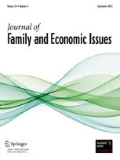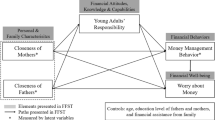Abstract
This exploratory study combines economic, family, and decision-making conceptual models to investigate the factors influencing resource transfers as reported by older adults. Pilot data on 61 adult children was obtained during face-to-face interviews with 18 older parents. Hierarchical multiple regressions were conducted to predict time (emotional support) and financial (cash and gifts) inter vivos transfers from demands, resources, values, and relationships. Positive health ratings, strong affection for the adult child, and money retention attitudes were associated with frequent emotional support. Small household size predicted frequent financial transfers. Results indicate the importance of values, resources, demands, and relationships in predicting resource transfers from older parent to adult child.

Similar content being viewed by others
References
Aquilino, W. S. (2005). Impact of family structure on parental attitudes toward the economic support of adult children over the transition to adulthood. Journal of Family Issues, 26, 143–167.
Becker, G. S. (1981). A treatise on the family. Cambridge, MA: Harvard University Press.
Berry, B. M. (2001a). All the ties that bind: Race, ethnicity, and why families support adult children (Populations Studies Center Research Report 01–487). Ann Arbor, MI: University of Michigan Institute for Social Research.
Berry, B. M. (2001b). Financial transfers from parents to adult children: Issues of who is helped and why (Populations Studies Center Research Report 01–485). Ann Arbor, MI: University of Michigan Institute for Social Research.
Berry, B. M. (2001c). What explains race and ethnic differences in family financial transfers to adult children? (Populations Studies Center Research Report 01–486). Ann Arbor, MI: University of Michigan Institute for Social Research.
Cooney, T. M., & Uhlenberg, P. (1992). Support from parents over the life course: The adult child’s perspective. Social Forces, 71, 63–84.
Cox, D., & Rank, M. R. (1992). Inter-vivos transfers and intergenerational exchange. The Review of Economics and Statistics, 74, 305–314.
Deacon, R. E., & Firebaugh, F. M. (1981). Family resource management: Principles and applications. Boston: Allyn and Bacon.
Eggebeen, D. J. (1992). Family structure and intergenerational exchanges. Research on Aging, 14, 427–447.
Eggebeen, D. J., & Hogan, D. P. (1990). Giving between generations in American families. Human Nature, 1, 211–232.
Furnham, A. (1984). Many sides of the coin: The psychology of money usage. Personality and Individual Differences, 5, 501–509.
Hayhoe, C. R. (2002). College students’ use of credit: At two points in time. Journal of Family and Consumer Sciences: From Research to Practice, 94(1), 71–77.
Hayhoe, C. R., Leach, L., Allen, M.W., & Edwards, R. (2005). Credit cards held by college students. Financial Counseling and Planning, 16(1), 1–10.
Hayhoe, C. R., & Wilhelm, M. S. (1998). Modeling perceived economic well-being in a family setting: A gender perspective. Financial Planning and Counseling, 9(1), 21–34.
Killian, T. S. (2004). Intergenerational monetary transfers to adult children and stepchildren: A household level analysis. Journal of Divorce & Remarriage, 42, 105–130.
MacDonald, M. M. (1989). Family background, the life cycle, and inter-household transfers (Working Paper No. NSFH 13), Madison, WI: University of Wisconsin-Madison, Center for Demography and Ecology.
McGarry, K. (1999). Inter vivos transfers and intended bequests. Journal of Public Finance, 73, 321–351.
McGarry, K., & Schoeni, R. F. (1997). Transfer behavior within the family: Results from the asset and health dynamics study. The Journals of Gerontology, 52B, 82–92.
Markides, K. S., Boldt, J. S., & Ray, L. A. (1986). Sources of helping and intergenerational solidarity: A three-generation study of Mexican Americans. Journals of Gerontology, 41, 506–511.
Silverstein, M., Bengtson, V. L., & Lawton, L. (1997). Intergenerational solidarity and the structure of adult child-parent relationships in American families. American Journal of Sociology, 103, 429–460.
Silverstein, M., Conroy, S. J., Wang, H., Giarrusso, R., & Bengtson, V. L. (2002). Reciprocity in parent-child relations over the adult life course. Journal of Gerontology: Social Sciences, 57B, S3–S13.
Soldo, B. J., & Hill, M. S. (1993). Intergenerational transfers: Economic, demographic, and social perspectives. In G. L. Maddox, & L. M. Powell (Eds.), Annual review of gerontology and geriatrics: Focus on kinship, aging, and social change (pp. 187–216). New York: Springer.
Soldo, B. J., & Hill, M. S. (1995). Family structure and transfer measures in the Health and Retirement Study: Background and overview. The Journal of Human Resources, 30, S108–S137.
Stum, M. S. (2000a). Families and inheritance decisions: Examining non-titled property transfers. Journal of Family and Economic Issues, 21, 177–202.
Stum, M. S. (2000b). Later life financial security: Examining the meaning attributed to goals when coping with long term care. Financial Counseling and Planning, 11(1), 25–37.
Taylor, R. J. (1986). Receipt of support from family among black Americans: Demographic and familial differences. Journal of Marriage and the Family, 48, 67–77.
Wilhelm, M. S., & Varcoe, K. (1991). Assessment of financial well-being: Impact of objective economic indicators and money attitudes on financial satisfaction and financial progress. In S. M. Danes (Eds.), Proceedings of the fourth annual conference of the association of financial counseling and planning education (pp. 184–201). Kansas City: MO.
Wong, R., Capoferro, C., & Soldo, B. J. (1999). Financial assistance from middle-aged couples to parents and children: Racial-ethnic differences. Journal of Gerontology: Social Sciences, 54B, S145–S153.
Author information
Authors and Affiliations
Corresponding author
Rights and permissions
About this article
Cite this article
Hayhoe, C.R., Stevenson, M.L. Financial Attitudes and Inter vivos Resource Transfers from Older Parents to Adult Children. J Fam Econ Iss 28, 123–135 (2007). https://doi.org/10.1007/s10834-006-9054-3
Published:
Issue Date:
DOI: https://doi.org/10.1007/s10834-006-9054-3




